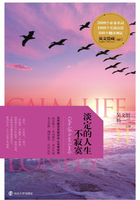
第5章 下一站幸福 (4)
I believe in the importance of pace. I grew up in a frenetic household, both parents working jobs that demanded their attention 24/7. I was little and fast and rushed around, and I still have that person inside me, always at risk of moving too quickly, missing the connection, making mistakes.
The forest behind our house offered a peaceful respite. My passion for the vertical world took me from tall trees in my backyard to climbing steep cliffs and crags. As a teen, I was moving easily over the landscapes of the American West and was drawn to higher summits. When I was 19, I learned something called the “rest step” from an old mountain climber named Paul Petzoldt. He advised me to rest in the middle of each step completely, but briefly. The rest step, which I still practice today, allows me to walk or climb with little effort. I can move very quickly yet still find a pause in every step.
The awareness of pace—that I owe to my teacher—has served me whether I am seeking the world’s highest summits, sharing my love for the mountains with others or kneeling to look my son, Gus, in the eye when he has a question.
It serves me as I drive, adjusting my speed to gain a bit of calm and reach my destination only minutes behind the “record time” a faster lane might provide. It serves me at home where we maintain a tradition of gathering each night at the dinner table to eat and talk to each other.
In times of crisis, pace comes to my aid. Another of Petzoldt’s lessons was when faced with an emergency, sit down, collect yourself, make a plan. When needs seem most urgent—even life-threatening—the practice of slowing down offers calm and clarity.
In 1987, I was in Pakistan to climb Gasherbrum II, one of the world’s highest peaks. We were a small group and it was a very big mountain. Our expedition faced more than its share of difficulty: A long storm wiped out most of our food rations and an avalanche devastated our camp, obliterating our tents. One of our party developed altitude sickness; blood poisoning threatened another. In the face of each disaster, we carefully developed a new plan. Snow caves replaced lost tents. Soups replaced full meals. Eventually we climbed slowly to the top, then made our way safely down.
Concentrating on how I move through the world is important. It’s why I reach mountain summits and life goals with energy to spare.
There is magic in any faith. Every once in a while, rushing about, my belief in pace rises up, slows me down and grants me a view of a sunset, a smile from a stranger or a conversation with a child. I owe these moments to what I learned from an old mountain climber and have practiced ever since.
我十分相信速度的重要性。我从小就是在风风火火的环境中长大的,父母整整一周每天24小时无休止地忙碌。我从小就莽撞,直到现在还是没有多大改变,做起事来经常是草草了事,注重片面,错误不断。
我家屋后的林子是一个静静歇息的好地方。我热衷于挑战垂直高度,从开始爬后院的大树,到后来攀爬悬崖峭壁。十几岁的时候,美国西部的地形对我来说已没有什么难度,攀爬起来非常轻松。后来,我便转向了更高的顶峰。19岁时,我从一位名叫保罗?佩索特的攀山老前辈那里学习了一种叫“歇步”的攀山方法。他告诉我,在步伐之间要有完全而短暂的停歇。时至今日,我还在练习“歇步”。正是这种步伐,让我走路或爬山省了不少力气。虽然我每走一步都有所停顿,但动作仍然敏捷迅速。
多亏这位前辈的帮助,他对速度的理解让我受益匪浅。不管是在寻求征服世界巅峰的过程中,还是和别人分享我对高山的热爱之情,或是我蹲下来注视儿子格斯的双眼,聆听他的困扰时,我对速度的理解都发挥了巨大的作用。
对速度的理解会在我开车时帮助我,让我调整好速度,沉着驾驶,最终到达目的地的时间比开快车的“最佳时间”仅仅慢了几分钟而已。对速度的理解让我们家保留了一个传统——每天晚上,全家人都要聚在饭桌前吃饭聊天。
危急时刻,对速度的理解总会助我脱离险境。佩索特教我的另一个经验是,遇到突发情况,先坐下来,保持镇定,然后制定解决问题的方案。当面临最紧急的情况时,甚至在生死攸关的时刻,“缓一步”的做法能让你心态平静,头脑清晰。
1987年,我到巴基斯坦去攀登世界最高峰之一的迦舒布鲁木峰。我们是一支规模很小的登山队,面前却是一座庞然巨峰。我们的整个探险历程波折重重:持续不断的风暴卷走了我们大部分的食物,雪崩毁坏了我们的营地,埋没了帐篷;队伍中的一员出现了高原反应,而败血症又威胁着另一个队员的生命;在面对接踵而来的灾难危机时,我们仔细地斟酌新的应对计划。我们用冰雪窑洞替代了帐篷,简单的汤羹代替了全餐。最终,我们慢慢地登上了顶峰,然后又安全返回。
为什么我能攀上世界高峰,实现自己的人生目标,并且不至于殚精竭虑?集中注意力,看我是怎样发挥行动力才是最重要的。
每一种信念都有它的魔力。每当自己显得急躁时,那份对速度的信念就会浮现在脑中,让我调慢节奏,赐予我享受日落斜阳美景的机会,体会萍水相逢的笑容,感悟童言无忌的稚趣。能够享受所有美好的时刻,完全归功于那位登山前辈给我的忠告。当然,我对“慢”的练习也是不可或缺的。
记忆填空
1. When I was 19, I learned something called the“rest step”from an old mountain named Paul Petzoldt. He_______me to rest in the middle of each step completely, but briefly. The rest step, which I still practice today, allows me to walk or with little effort. I can move very quickly yet still find a pause in every_______.
2. Every_______ in a while, rushing about, my belief in_______ rises up, slows me_______and grants me a view of a sunset, a smile from a stranger or a conversation with a child.
佳句翻译
1. 危急时刻,对速度的理解总会助我脱离险境。
2. 当面临最紧急的情况时,甚至在生死攸关的时刻,“缓一步”的做法能让你心态平静,头脑清晰。
3. 每一种信念都有它的魔力。
短语应用
1. A long storm wiped out most of our food rations and an avalanche devastated our camp, obliterating our tents.
wipe out:彻底摧毁;消灭;擦净;擦掉
2. Concentrating on how I move through the world is important.
move through:穿过
用快乐激发出更多的快乐
Happiness Is a Stimulus
佚名 / Anonymous
Many have sought a variety of sources for their feeling of happiness. Some have put their heart and efforts into their work. Too many turned to drugs and alcohol. Untold numbers have looked for it in the possession of expensive cars, exotic vacation hoes, and other popular “toys”. Most of their efforts have a root in one common fact that people are looking for a lasting source of happiness.
Unfortunately, I believe that happiness evades many because they misunderstand the process and journey of finding it.
Today, some people think that an expensive car is stimulus. Happiness is a response. A great paying job is stimulus. Happiness is a response. A loving relationship is stimulus. Happiness is a response. This belief leaves us thinking and feeling: “I’ll be happy when ...”